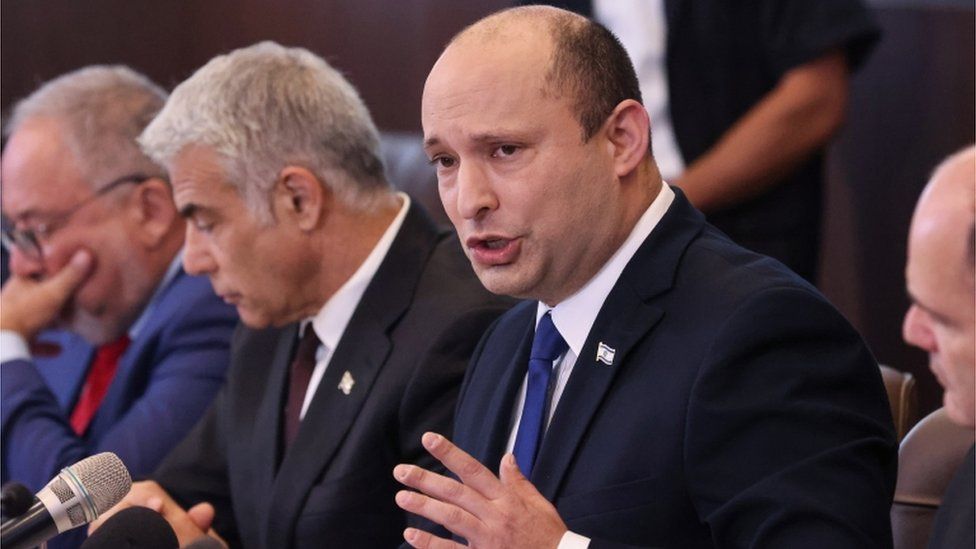Iran nuclear deal: Israel warns Iran as talks progress
- Published

Israel's prime minister has called on the US and its allies to "wake up" to the threat of Iran as talks continue to revive a landmark deal to limit the country's nuclear programme.
Naftali Bennett said Iran's "regime of brutal hangmen" wants nuclear weapons, something Iran has repeatedly denied.
Diplomats said progress was made to renew the deal, which the US withdrew from under President Donald Trump, but there were still gaps to be bridged.
Israel opposes the agreement.
Iran elected hardliner Ebrahim Raisi, the country's top judge who holds ultra-conservative views, as new president on Friday, in a race widely seen as being designed to favour him.
The president-elect - who will be inaugurated in August - is under US sanctions and has been linked to past executions of political prisoners.
Negotiators from the six signatory countries - the US, UK, France, China, Russia and Germany - and Iran have been holding talks since April to revive the deal, which saw Iran limit its nuclear activities in return for sanctions relief.
Iran, however, has been violating the deal since the US unilaterally left it.
On Sunday, the countries gathered for a sixth round of indirect talks between the US and Iran in Vienna, but adjourned for the delegates to return to their capitals.
Iran nuclear crisis: The basics
- World powers don't trust Iran: Some countries believe Iran wants nuclear power because it wants to build a nuclear bomb - it denies this.
- So a deal was struck: In 2015, Iran and six other countries reached a major agreement. Iran would stop some nuclear work in return for an end to harsh penalties, or sanctions, hurting its economy.
- What is the problem now? Iran re-started banned nuclear work after former US President Donald Trump pulled out of the deal and re-imposed sanctions on Iran. Even though new leader Joe Biden wants to rejoin, both sides say the other must make the first move.
Iranian Deputy Foreign Minister Abbas Araqchi told state television the parties were "now closer than ever" to a deal, but added that bridging the remaining distance between them was "not an easy job".
Enrique Mora, envoy for the EU, echoed Mr Araqchi, saying progress on technical issues had given them greater clarity, giving them a "clear idea of what the political problems are".
The US national security adviser, Jake Sullivan, said there was "still a fair distance to travel" on issues including sanctions and on the commitments Iran needed to make. Iran is currently enriching uranium at its highest levels ever, although still short of what is needed to make nuclear-grade weapons.
A spokesman for the US state department earlier said the indirect talks would still continue after Mr Raisi takes power.
Iran election: Wariness and welcome for Ebrahim Raisi
Why does Israel oppose the deal?
Iran and Israel have been in a long-running "shadow war", which has resulted in both countries taking part in tit-for-tat actions, but so far avoiding all-out conflict.
Ayatollah Khamenei - Iran's supreme leader - has repeatedly called for the elimination of the state of Israel. In 2018, he described the country as a "cancerous tumour" that had to be removed from the region.
Israel sees Iran as a major threat and has repeatedly insisted that it wants to develop nuclear weapons.
Prime Minister Bennett told his cabinet this was "the last chance for world powers to wake up... and understand who they are doing business with".
"A regime of brutal hangmen must never be allowed to have weapons of mass destruction."
Recently the hostilities between the two countries have escalated again. Iran blames Israel for the murder of its top nuclear scientist last year and an attack on one of its uranium enrichment plants in April.
Related Topics
- Published5 August 2021
- Published13 April 2021
- Published11 June 2021
- Published28 November 2020
- Published18 June 2021
- Published16 November 2021